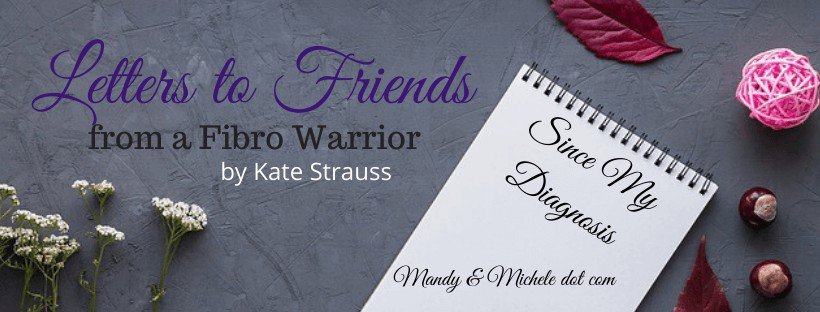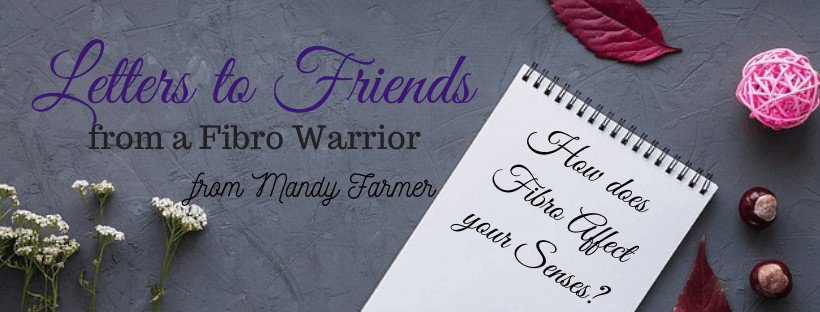It’s time for another Letter to Friends! Right after diagnosis, is probably the best time to share with your friends about fibromyalgia and how it affects you. Mainly because our world is so fast-paced, people will quickly forget that you have a health issue at all, especially when it comes to fibro and chronic pain. When we are seen in public, most people see a healthy person and never think twice about it. Others may ask, “how you are doing?”
I recently came in contact with Kate Straus through chronic illness communities. She worked in the education field for over ten years before fibromyalgia changed her life’s path. With a background in special education and early childhood intervention, she has compiled a toolbox of skills to help those with differences navigate life to make them the best that they can be.
Kate has learned, herself, that while fibromyalgia can be an obstacle, it has also revealed strengths that she did not know she had. She is easy to work with, listens well, and is compassionate. She is now a certified fibromyalgia coach helping those with fibromyalgia adjust to their new life.
Today, she has offered a letter that she wrote previously to friends and family to help them understand the struggles she faces with fibromyalgia. I invite you to continue reading to understand more fully challenges we, as fibro warriors, face.

Dear mother, father, sister, brother, cousin, aunt, uncle, grandmother, grandfather, son, daughter, friend, co-worker,
In speaking to a close friend recently, I realize that this letter isn’t just important, but crucial. I need to share some important information: Chronic pain is not a choice, it’s not enjoyable, and it’s not faked. Whether it’s LYME, Rheumatoid Arthritis, Multiple Sclerosis, Fibromyalgia, Myofascial Pain Syndrome, Lupus or any of the other disorders and diseases that cause chronic pain. According to the Mayo Clinic:
“Fibromyalgia is a disorder characterized by widespread musculoskeletal pain accompanied by fatigue, sleep, memory and mood issues. Researchers believe that fibromyalgia amplifies painful sensations by affecting the way your brain processes pain signals”.
Mayo Clinic
We are not looking for pity, and for those that are lucky enough not to deal with chronic pain, we don’t even require understanding. What we do ask for is respect. Respect that our pain is real, that the side effects of our pain, and the medications we take for our pain are real.
“How are you?” is a loaded question.
Do you want the answer that is given so that you don’t have to hear the whole *sordid* story; or, do you really want to know how we are doing? Because, we, as chronic pain sufferers, are phenomenal actors and actresses. I believe we should win awards for our “I am fine” answer. When we talk to others who suffer from chronic pain, we ask about each other and give a number from 1-10, in terms of the level of pain, with 1 being low and 10 being out of control. I’ve been lucky to have some friends catch onto that and ask me with the rating.
I guess what we want you to know is that our fine is usually different from your fine. Chronic pain means just that. Hardly a day goes by without some level of pain; however, we do have some days that are better than others. But, just because we “look good”, doesn’t mean we are ready to tackle a marathon or swim from Cuba to Florida (as one fellow “fibromite” made news – a clear exception to the rule – my mother is waiting for my turn to do the swim – just for clarification, I’ve NEVER been a good swimmer). Some of us are lucky enough to deal with low pain, and some of us are in so much pain, we require aids to help us walk (i.e. canes, walkers, wheelchairs).
Pain Affects Every Part of Your Body
Pain affects every functioning part of your body: physical, emotional, psychological, and sensorial. It affects your sleep, often causing disordered sleep. Some can’t seem to get enough sleep and some actually aren’t getting enough sleep.
It causes depression and anxiety.
It affects all five senses. Because you are in persistent pain, it’s difficult to exercise, whether it be gentle movement or anything at all, on some days.
It affects your ability to focus. For me, to be able to sit still is nearly impossible. If I’m watching TV, I’m also playing a game on my computer and texting with a friend. If I am reading, sometimes I need to re-read a paragraph over and over again. Some of us lose time. I am not referring to blackouts, per se; however, for me, I will stare off for what seems like moments, and its 20-30 minutes later.
We can be forgetful and have what’s called “brain fog”. It literally feels like there is a haze around your thoughts. It’s as if you have to wade through pea soup to be able to complete simple tasks. Honestly, sometimes I would prefer the pain to the fog.
Up until a few years ago, people were fascinated by my ability to remember things. My long-term memory still stands strong; however, my short-term memory has become quite weak. I try to play puzzle and quiz games to strengthen this present weakness.
After Diagnosis
My chronic pain diagnoses are fibromyalgia and chronic fatigue syndrome. Interestingly enough, these are two disorders that my father researched over 30 years ago. There are many overlapping characteristics that fall within these two disorders. I am lucky and grateful that I have had a friend introduce me to support groups (all online) which in turn have brought me more friends that *get* me. It’s nice to be understood in that respect.
Ask me Anything
I am open, as are most of my friends, in talking about our chronic pain disorders. Please feel free to ask me any questions you’d like about either of these two disorders. I can tell you how I feel, and if I don’t have answers to other questions you might have, I have places to direct you.
… not a comprehensive list
Just please understand that chronic pain illnesses are often thought of as “invisible illnesses” because you can’t see a visible reason for the pain. This doesn’t mean we aren’t hurting. So, the next time you see someone that you know has a chronic pain disorder, or you see someone walking out of a car in a disabled parking spot with seemingly no difficulty, please don’t judge. Don’t assume.
And for goodness sake, please don’t ever say, “But, you don’t look sick.” Share on XSincerely yours,
Kate Strauss
Certified Fibromyalgia Advisor

Thank you, Kate, for these words of wisdom.
Readers, if you are a fibro warrior and need some life coaching to adjust to your new different life. You might like to contact Kate for that assistance. She is certified to help you. Learn more about her at her own website, Spoons to Share Don’t miss any of the “letters” we are writing. Check out previous letters and subscribe to this series on the main “Letters to Friends” page. If you know someone with fibromyalgia (and you probably do), join my Facebook page Fibromyalgia, Is it For Real?

MORE QUESTIONS ABOUT FIBROMYALGIA?
- What is Fibromyalgia?
- Explaining What Fibro Pain is Like
- Letters to Friends ~ How Are You Doing Since Your Diagnosis?
- Is There a Cure for Fibromyalgia?
- 5 Ways Fibromyalgia Pain Assaults our Senses
- What is Fibro Fog? Why are you Crashing?
- Fibromyalgia ~ What You Need to Understand

Kate Straus worked in the education field for over ten years before fibromyalgia changed her life’s path.
With a background in special education and early childhood intervention, she has compiled a toolbox of skills to help those with differences navigate life to make them the best that they can be.
Kate has learned, herself, that while fibromyalgia can be an obstacle, it has also revealed strengths that she did not know she had. She is easy to work with, listens well, and is compassionate.
She looks forward to using these strengths, her background, and her knowledge from the International Fibromyalgia Coaching Institute to advise others with fibromyalgia to learn how to live their new “normal” life.







Thank you again Mandy for this great series of “letters to friends.” And thank you Kate for sharing from your heart, and truly “getting it” with the way we all struggle. Your words are an encouragement, knowing that there are so many others who have the same kinds of daily difficulties. Blessings to you!
Thank you for all you do to educate others about the invisible illnesses.
Thank you, dear Mandy, for helping us understand that not everyone’s fine is the same. I have constant low-grade pain due to osteoarthritis; however, fine for me is when it’s a low pain day. On my high-pain days it’s not so good. I’m thankful the challenging days are rare–so far.
Blessings ~ Wendy
It’s true that we often don’t want to tell people the real way we feel. I have a friend or two that look in my eyes and can tell it’s a bad day. I too am dealing pretty well with my pain, but there is always pain. Others just don’t’ realize it.
My own pain has caused me to realize the pain of others. Thanks fo dropping by.
And thank you for being my biggest cheerleader!
Hi Wendy,
I am the author of the letter. Thank you for your feedback! I’m sorry to hear you struggle with pain. Each day is a new day and I try my best to make it the best day I can even when I am in tremendous pain. Sounds like you have a similar attitude. Wishing you low pain days!
Take care,
Kate
Anita,
Thank you for your kind response to my letter!
Take care,
Kate
Hi Bettie!
Thanks for your kind comments. I find that people respond best when you write/speak from your heart.
Take care,
Kate
My mother and my grandmother both suffer from fibromyalgia and it is really hard. I have so much respect for the way they handle their pain and don’t let it stop them from having a full life. That said, it breaks my heart to know how much they suffer and that they do so often in silence because most people don’t understand what they are going through and they don’t want to bring anyone down. You should always be able to express how you are feeling honestly and receive compassion whether your ailment is visible or not. I’m so happy to see so many people speaking out about fibromyalgia over the last five years or so. It’s important that we all are educated on this. Thanks for sharing!
This is so helpful. One of my former Confirmation Youth has Potts syndrome. This gave me good food for thought of what to ask when I’m visiting with her and others who live with chronic pain.
I can’t imagine how hard fibro must be; I have a couple of lethal cancers, but there’s something of a fierce joy in fighting them, even though I’m losing (and no-one tells me I don’t look sick!).
I do find that there’s a needed ‘intentionality’ in keeping a positive outlook, and if I find a book, for instance, or DVD isn’t helping, I’ll drop it flat. No more of the “I really should finish this”.
I think you’ve helped a lot of people with this letter. Thanks for taking time to write it.